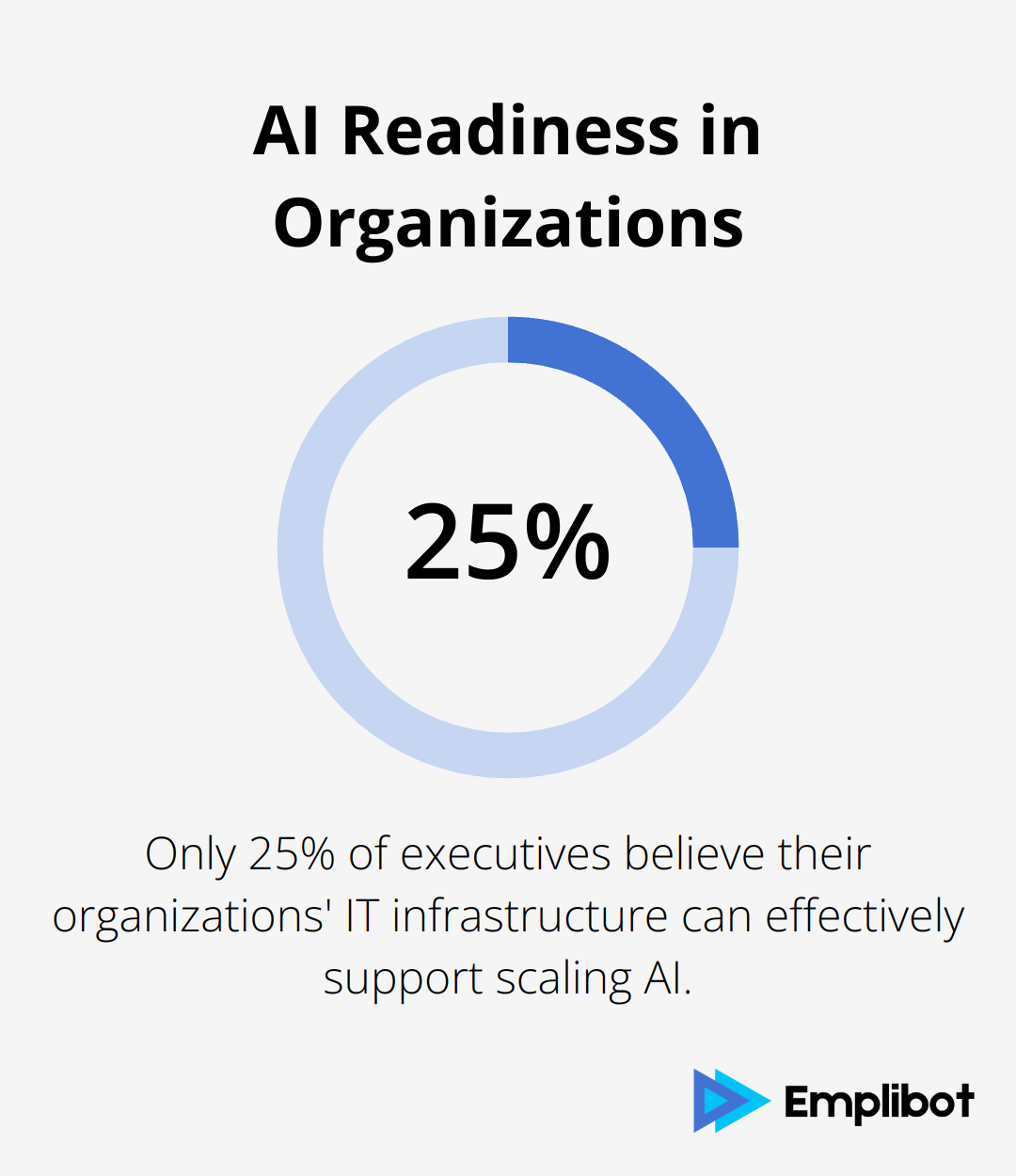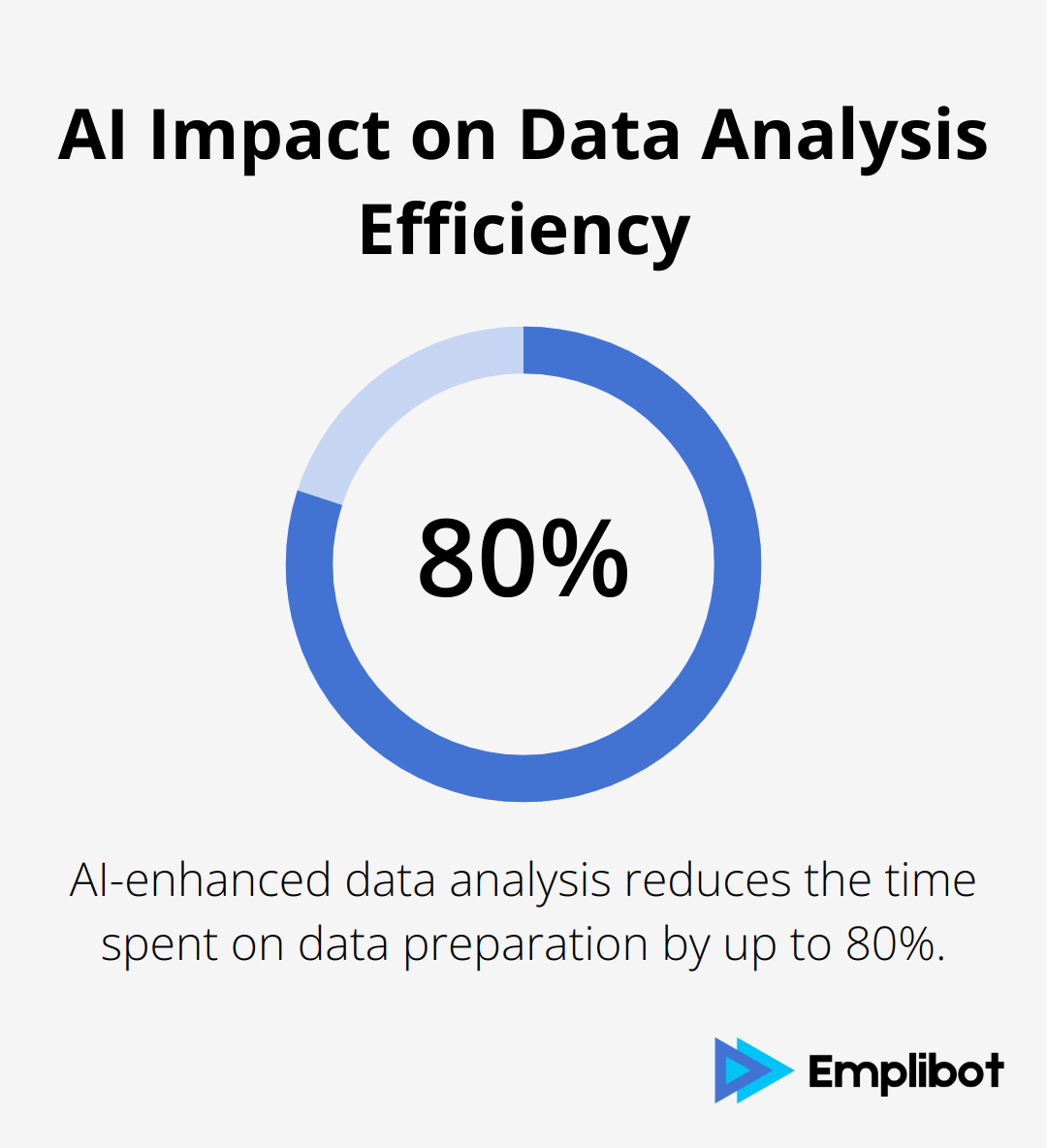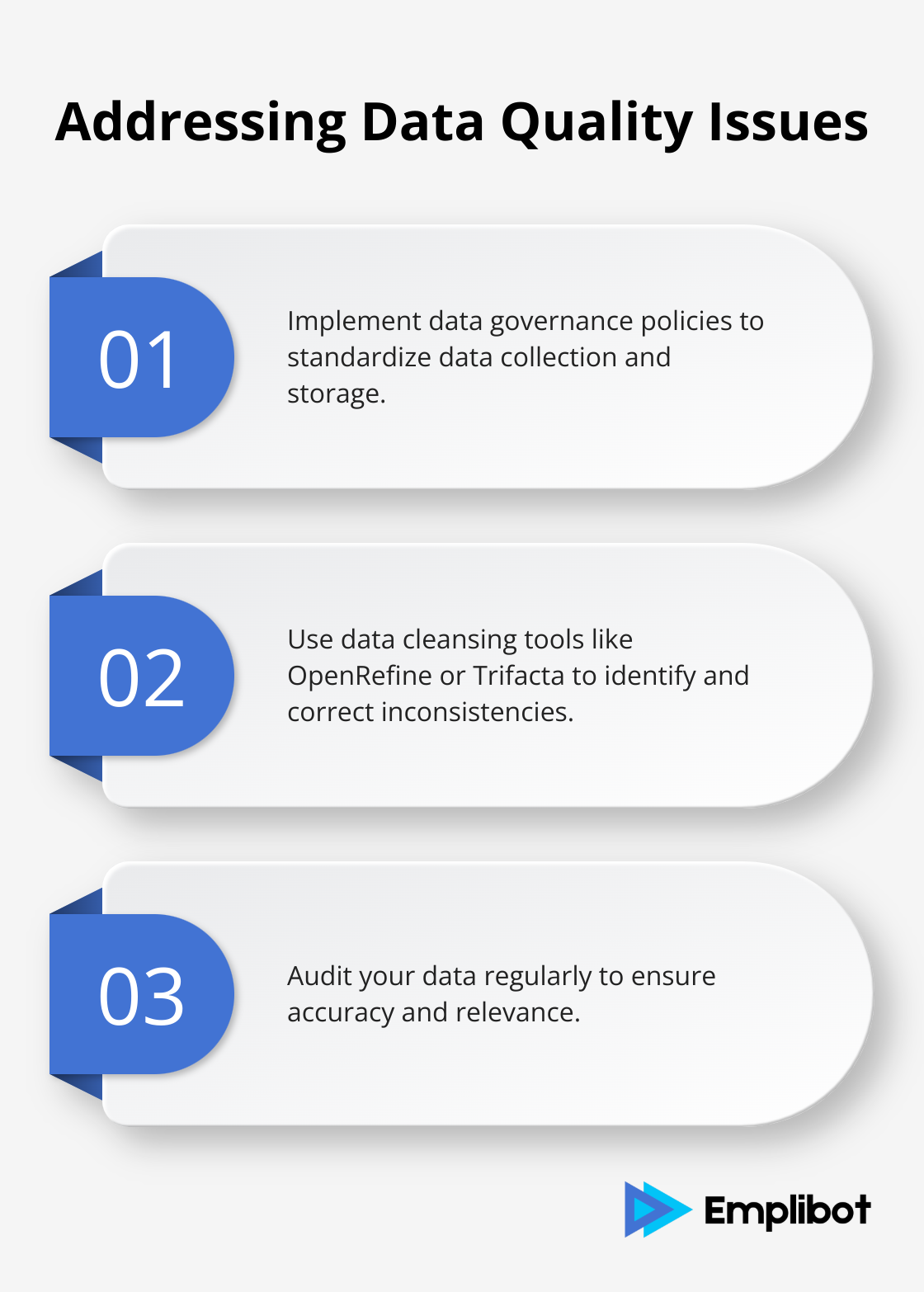AI strategies for consulting firms are reshaping the industry landscape. At Emplibot, we’ve seen firsthand how these technologies can revolutionize service delivery and client outcomes.
This blog post will guide you through developing a winning AI strategy for your consulting firm. We’ll cover everything from assessing your readiness to implementing solutions and overcoming challenges.
Is Your Consulting Firm Ready for AI?
Technological Infrastructure Assessment
The first step in developing a winning AI strategy involves evaluating your current tech stack. A 2023 IBM study revealed that only 25% of executives believe their organizations’ IT infrastructure can effectively support scaling AI. This statistic underscores the importance of a robust technological foundation.

To assess your readiness, examine your data storage capabilities, processing power, and network infrastructure. Do you have access to cloud computing resources? Are your systems integrated and capable of handling large datasets? If not, you should consider upgrading your infrastructure before implementing AI solutions.
Identifying AI Use Cases
The next step requires you to pinpoint where AI can add the most value to your consulting practice. Focus on repetitive tasks that consume significant time. Data analysis, report generation, and client communication often present prime candidates for AI enhancement.
McKinsey’s latest survey on AI finds that organizations are beginning to take steps that drive bottom-line impact. This suggests that AI can potentially improve efficiency in tasks like market analysis and competitor research, allowing consultants to focus on high-value activities such as strategy development and client relationship management.
Skill Gap Analysis
The final step in assessing AI readiness involves evaluating your team’s AI capabilities. The Future of Jobs Report 2023 by the World Economic Forum explores how jobs and skills will evolve over the next five years. This suggests that your consulting team may also need to adapt to the changing landscape.
Conduct a skills inventory to determine your current capabilities. Do you have data scientists or machine learning experts on staff? Are your consultants familiar with AI concepts and tools? Identify gaps and create a plan to address them through training or strategic hiring.
AI readiness extends beyond technology-it’s about people too. Try to foster a culture of continuous learning and adaptability. This approach will prove invaluable as AI continues to evolve and reshape the consulting landscape.
Preparing for Implementation
Once you’ve assessed your firm’s AI readiness, you’ll be well-positioned to develop and implement a successful AI strategy. This preparation phase sets the stage for the next critical step: effectively implementing AI solutions in your consulting services.
In the upcoming section, we’ll explore how to leverage AI to enhance your data analysis capabilities, automate routine tasks, and improve client communication. These implementations (when done correctly) can significantly boost your firm’s efficiency and competitive edge in the rapidly evolving consulting industry.
How AI Can Transform Your Consulting Services
AI solutions in consulting services can significantly enhance your firm’s capabilities and value proposition. Let’s explore practical ways to leverage AI in your consulting practice.
Supercharge Data Analysis
AI-powered analytics can provide deeper insights compared to traditional data analysis methods for consultancy firms. Natural language processing (NLP) algorithms quickly sift through thousands of customer reviews, social media posts, and industry reports to identify trends and sentiment. This allows consultants to provide clients with more comprehensive and timely insights.
A study by Deloitte found that AI-enhanced data analysis reduces the time spent on data preparation by up to 80%. This frees up consultants to focus on higher-value tasks like strategy development and client relationship management.

To implement AI-driven data analysis in your consulting firm, consider tools like Tableau or Power BI (which offer AI-powered features for data visualization and predictive analytics). These platforms help uncover hidden patterns and correlations in your clients’ data, leading to more informed recommendations.
Streamline Routine Tasks
Automation of routine tasks is another area where AI can significantly impact consulting services. McKinsey research sizes the long-term AI opportunity at $4.4 trillion in added productivity growth potential from corporate use cases. This includes tasks like scheduling meetings, generating reports, and conducting initial research.
AI-powered project management tools automatically assign tasks, track progress, and flag potential delays. This allows project managers to focus on strategic decision-making rather than administrative details.
Tools like Asana or Monday.com (which incorporate AI features to optimize project workflows) can help your team work more efficiently and deliver projects on time and within budget.
Elevate Client Communication
AI also enhances client communication and engagement. Chatbots and virtual assistants handle initial client inquiries, schedule meetings, and provide basic information, freeing up consultants’ time for more complex client interactions.
AI-powered sentiment analysis helps consultants gauge client satisfaction and identify potential issues before they escalate. An Accenture study found that 61% of customers prefer companies that offer AI-driven personalization.
To improve client communication, try implementing a CRM system with AI capabilities, such as Salesforce Einstein. These systems provide predictive insights about client needs and preferences, allowing consultants to tailor their approach and deliver more personalized service.
Balance AI and Human Expertise
While AI offers tremendous potential to transform consulting services, it’s important to remember that it should augment, not replace, human expertise. The most successful AI implementations in consulting strike a balance between technological capabilities and human insight.
As you implement these AI solutions, keep in mind that the technology landscape constantly evolves. Stay informed about the latest AI developments and be prepared to adapt your strategy as new tools and capabilities emerge.
The next chapter will address the challenges you might face when implementing AI in your consulting firm and provide strategies to overcome them.
Navigating AI Implementation Hurdles
Ensuring Data Quality and Privacy
Data quality forms the foundation of effective AI. Poor data quality costs organizations at least $12.9 million a year on average, according to Gartner research from 2020. To address this issue:

- Implement data governance policies to standardize data collection and storage.
- Use data cleansing tools (like OpenRefine or Trifacta) to identify and correct inconsistencies.
- Audit your data regularly to ensure accuracy and relevance.
Privacy concerns are equally important. The GDPR has set a global standard for data protection, with fines up to €20 million or 4% of global turnover for non-compliance. To safeguard client data:
- Conduct regular privacy impact assessments.
- Implement robust encryption methods for data at rest and in transit.
- Train staff on data handling best practices and privacy regulations.
Fostering AI Adoption Among Staff
Change management plays a key role in successful AI implementation. A 2021 McKinsey survey showed that 56 percent of respondents report AI adoption in at least one function, up from 50 percent in 2020. To encourage adoption:
- Provide comprehensive AI training programs. (Companies like Coursera and edX offer tailored AI courses for businesses.)
- Create an AI Center of Excellence to support teams and share best practices.
- Showcase early wins to build enthusiasm. For instance, demonstrate how AI-powered analytics reduced report generation time by 70%.
Maintaining the Human Touch
AI can significantly enhance consulting services, but it’s important to maintain the human element. A 2022 PwC survey found that 82% of consumers want more human interaction in the future, not less. To strike the right balance:
- Use AI for data analysis and routine tasks, but rely on human expertise for strategy formulation and client relationships.
- Implement AI-assisted decision-making tools that provide recommendations but leave final decisions to consultants.
- Assess the impact of AI on client satisfaction regularly and adjust your approach accordingly.
Overcoming Technical Challenges
The implementation of AI often presents technical hurdles. A 2023 IBM study showed that only 25% of executives believe their organizations’ IT infrastructure can effectively support scaling AI. To overcome these challenges:
- Invest in robust cloud computing resources to handle large datasets and complex AI algorithms.
- Integrate your existing systems to ensure seamless data flow and AI functionality across your organization.
- Partner with experienced AI solution providers (such as Emplibot) to leverage their expertise and avoid common pitfalls.
Final Thoughts
AI strategies for consulting firms revolutionize service delivery and client outcomes. Firms must evaluate their technological infrastructure, identify high-impact AI use cases, and analyze their team’s skills to set a strong foundation. Successful AI integration enhances data analysis, streamlines tasks, and elevates client communication, positioning consulting practices at the forefront of innovation.
The path to AI adoption presents challenges, including data quality concerns and change management. Firms must address these obstacles proactively to ensure a smooth transition and maximize AI benefits. Those who embrace AI gain a significant competitive advantage, delivering deeper insights, faster turnaround times, and more personalized services.
Consulting firms can streamline their content marketing efforts alongside their AI strategy with Emplibot’s comprehensive solution. Emplibot automates blog content creation and social media management, allowing firms to maintain a strong online presence while focusing on core consulting activities. The future of consulting is AI-powered, and firms must act now to redefine what’s possible in the industry.

